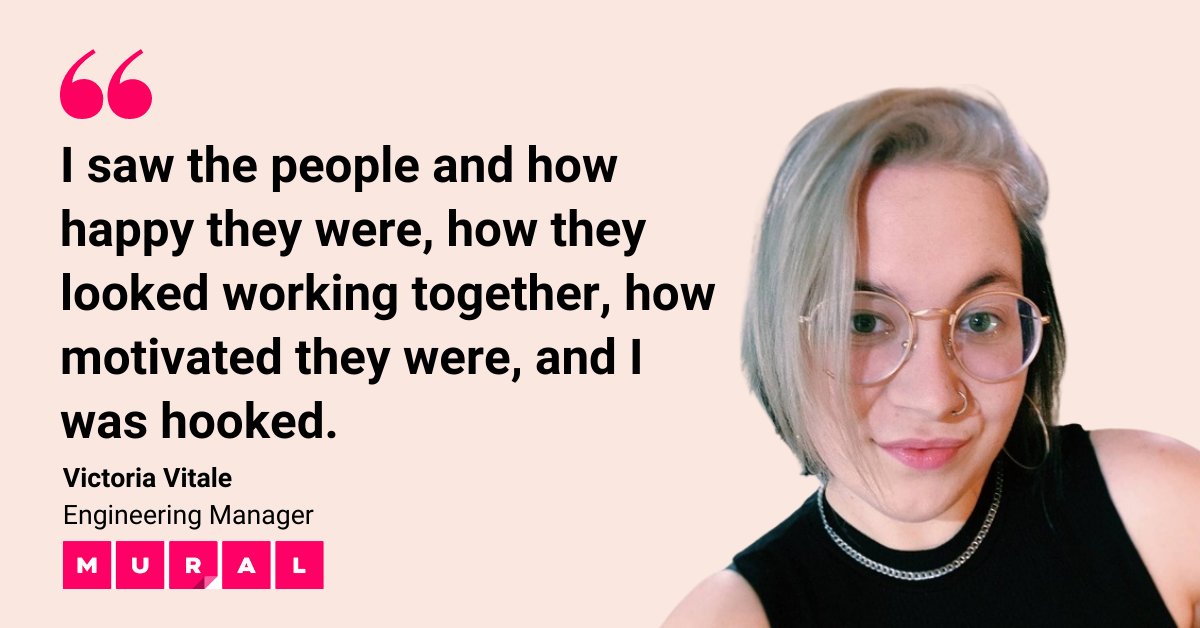Victoria Vitale has always had a passion for computers, but that passion isn't what drove her to become a software developer.
It was practicality.
"I needed a job that could pay rent!" explains Victoria with a wry smile. A friend suggested she apply for a data analyst role, telling her that she could learn any necessary skills on the job. A few months into the role, Victoria realized that friend was right—and that she wanted to grow her skillset even more and become a developer.
We sat down with Victoria to hear more about how she consciously built the career that she wanted—including her current role as an engineering manager at remote design tool company MURAL, and what advice she has for other people looking to do the same.
Putting Her Hand Up
Victoria, who hails from and lives in Buenos Aires, got her first engineering job because she spoke English. She learned everything else she needed, from how to structure databases to use SQL, once she got there. When she was working her second database job, she realized she could apply the same technique in the software space.
She just had to ask for the opportunity to do so.
"I was very curious about how things worked, so I started collaborating with the [software development] team whenever I could," says Victoria. She offered to QA for them—and then had to teach herself basic programming in a week's time when they took her up on it.
"That's when I knew I wanted to focus on that," says Victoria, who adds that she absorbed all the knowledge she could from that team before eventually switching into a developer role.
She faced a little imposter syndrome about the fact that she hadn't studied programming formally (though she was doing a second degree in multimedia design and web development). "There were a lot of pieces I had to put together as I went," says Victoria. "But I stayed very curious and motivated, and I trusted my team to help me."
Scaling with MURAL
Victoria was getting coffee with a friend who just happened to work at MURAL when she met some of his coworkers. "I saw the people and how happy they were, how they looked working together, how motivated they were, and I was hooked," she says. There wasn't an opening at the time, but she deployed her characteristic patience and applied as soon as there was one.
The job she ended up getting at MURAL was as an individual contributor—a step down from what she'd been doing at her previous company, where she was a lead software developer. Victoria didn't think twice about taking it. "It was an opportunity to work on a project where, even as an IC, I would have a lot of [opportunities to give] feedback on what was happening. At the time, there were 30 of us across just two teams, and I had a chance to build the product from scratch," she says. As excited as she was to develop hands-on product knowledge, she also knew that one day she'd like to return to a leadership role: "It was always in my mind that I wanted to come back to [management.]"
While she soaked up all of the product knowledge she could, MURAL grew. First it tripled, hitting nearly 100 employees. Victoria's mentor gave her a stretch project, and when she crushed it, he asked her to be a team lead of the newly-formed enterprise pillar.
"It was a mixture of me being passionate and curious, and him teaching me, seeing that potential, and wanting to help me grow," she reflects. "That's definitely key. Even if you're super motivated and enthusiastic about growing, if someone doesn't give you the space to do it, it's very hard."
Then MURAL hit another milestone that freed up a lot of space: it grew to 700 employees. Leadership realized that the team lead role needed to be split into technical leadership and people management responsibilities, and Victoria's manager asked her which role she was more interested in. As the only woman tech lead in a group of 11, she decided to stay on the technical side to deepen her skills there.
But a few months later, when she realized that the team really needed help scaling its strategy and hiring to keep up with growth, she decided to pursue the engineering management path.
"It wasn't a hard conversation," says Victoria. "My manager said, 'Hey, you're doing this already—why don't you step up to it [in a new role]?'"
Victoria says she had lots of company support as she grew into a bigger management role. MURAL provided resources for hiring and focused on creating a truly global and remote culture where everyone could thrive.
"My growth at MURAL has been very organic. At the time I joined, I knew that one day I wanted to have another leadership role, but I couldn't know yet if MURAL would be the place for me to do it… As it turned out, as the company grew, so did I," says Victoria.
3 Tips for Engineers Wanting to Grow Their Careers
Victoria's combination of open-mindedness and determination has led her through an impressive career in engineering. Now that part of her role requires her to manage the career paths of others, she hopes she can pay that forward, starting with her advice for developers:
- Be curious! "Keep your eyes open and don't put yourself in a box," she says. "Get to know the product, the people. Doing that not only enriches you and makes you a better professional, it also empowers you."
- Be humble. When coaching her team, Victoria is careful to tell them what they're doing well along with what they need to work on. "Know your strengths, but also know what you still have to learn and what areas you can grow in. That leaves you open to learning from others," she says.
- Always teach others. Management might not be for everyone, says Victoria. She'll sometimes tell people that she thinks they'll be great tech leads and hear that they are uninterested in management. She doesn't force them, because that makes everyone involved miserable, she explains—instead, Victoria encourages them to share what they know with others, even if in a more informal mentorship or training capacity versus a full-out management role. "Pay back as much as you get from your surroundings and the people you work with," she says.




